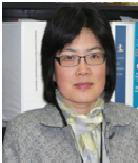March 2010 Continuing Education Program Presentaion Topics and Abstracts
| Name(in alphabetical order) |
|---|
| Barbara Ford, Presenter |
| Xudong Jin, Presenter |
| Diane Lai, Presenter |
| Win Shih, Presenter |
| Sally C. Tseng, Presenter |
| Tim Jiping Zou, Presenter |
|
Presentation topic 1: Public relations, communications, and advocacy Abstract:Library public relations involve everybody who has connection with the library. A successful public relations program seeks to establish a positive image of the library, involves the community using communication and outreach activities, and promotes the library services and programs. The presentation will discuss the strategies and methodologies for developing public relations, using examples from U.S public libraries. Presentation topic 2: Library Associations; Together We are Stronger Abstract:Library associations provide essential services for librarians and libraries including conferences, publications, standards, professional development, and advocacy. The presentation talks about the International Federation of Library Associations (IFLA) and the American Library Association (ALA) which have been active in advocating for libraries and library services, promoting standards and core values, as well as encouraging life-long learning and professional education. Back to Top |  View Bio |
| Xudong Jin Presentation
Presentation topic: Library Management and Operation Abstract: : Library management and operation are core components of a library. Based on personal experience as Associate Director of libraries at Ohio Wesleyan University for more than 10 years and reading of several books of public library management, the presenter will introduce aspects of management and operation of American public libraries, including organization and structure, management of large, medium, and small public libraries; trustees and relations between trustees and relations between trustees and library directors, relations between a public library and local, state, and federal governments, relations between a public library and its readers; making policies, making short-term and long-term strategic plans. On aspect of human resources management, the presenter will mention how to recruit a director, a department head, a librarian, and a staff; and staff training, salaries and other benefits. On aspect of budget management, he will discuss revenue, fund raising, operating revenue, and budget planning. The presenter will speak on collection development and library consortia of public libraries. He will also present the requirements for a public library director, including candidate's degree, experience, management philosophy, initiative, and abilities of deal with all management issues. At the last, the presenter will mention that challenges and opportunities towards public libraries. Back to Top |
|
Presentaion Topic: Public Library Services Abstract: Public libraries strive to enrich lives by fostering lifelong learning and by ensuring that every member of the local community has access to a vast array of ideas and information. With local tax as its chief funding source, meeting community needs is the ultimate goal for all services provided by public libraries. As the local community needs evolve along with social, economic, cultural, and technological changes, how to keep these services relevant to the communities has presented challenges and opportunities to many public libraries. In this presentation, Diane Lai will use San Jose Public Library as an example to cover these topics: 1. General services and organizational structure to provide them; 2. Value of programming and special projects; 3. Role of technology and its impact on service delivery. |  View Bio |
|
Presentaion Topic: From Good to Great! Public Library Assessment Abstract: The future of libraries is closely associated with outcomes assessment and accountability in meeting the evolving demands of their customers. As a learning organization, libraries have to constantly and systematically assess and review their operation, services, and programs; and thus improve and enhance their performance, as well as sustain future funding and supports. The Library Assessment section will begin with an overview of the concepts and principles of library assessment, followed by its practice and methodology. We will then review tools and standards that public libraries in United States commonly use to measure their performance. Finally, we will discuss the importance of fostering a culture of assessment and evidence-based practice in managing library service to meet the needs of its community as well as stay relevant. The presentation begins with a brief history of the public library in U.S. to explain the legal basis of its present system: educational value, board form of government, and tax support. To clarify the framing of the legislation in U.S., a few basic factors about how the American system of government operates, the role of the U.S. Constitution, and how federal, state, and local governments interact are reviewed. Then, the presentation quotes the basic philosophy and policies in a number of state laws to demonstrate how the states incorporate the library as a public good in law. Federal library legislation is covered next, describing its state-based funding approach to influence and strengthen library services. Other critical sate and federal laws related to libraries are also reviewed, including intellectual freedom, privacy, copyright, Internet filtering, etc. The presentation concludes by suggesting a few basic principles and practical considerations in public library legislation and emphasizing the importance and need of energetic and proactive advocacy by librarians to ensure good laws are passed and implemented for the development and growth of public libraries. |  View Bio |
| Sally C. Tseng Presentation
Presentaion Topic: Management of Natural Disasters in American Libraries:1. Post-Earthquake Disaster Recovery and Rebuilding in American Libraries, Archives and Museums (for Chengdu only); 2. Library Disaster/Emergency Responses, Preparedness, Disaster Plans, and American Libraries’ Examples; and 3. Green Library. Abstract: Natural disasters such as earthquakes, fires, floods, storms, hurricanes, typhoons and tsunamis have caused enormous casualties, destroyed or seriously damaged buildings, homes, and other structures. Archives, libraries, museums and cultural centers are no exception. They pose enormous challenges to administrators and staff. We cannot prevent damages or losses from natural disasters. However, we can develop strategic plans, preparedness, drills and emergency responses to reduce and minimize potential loses. The author will cover: Library disaster/emergency plans, preparedness, responses and American libraries’ examples. Limited to time, the author will discuss cases studies and examples of lessons learned from on post-earthquake recovery and rebuilding based on American academic and public libraries’ experiences and practices. The author will also discuss a new concept of green library so as to keep the environment clean and economically friendly. The goals of the author are to share American experiences and practices on managing disasters, preparedness, responses and recovery and research work on rebuilding through these presentations for the following capacities:
Back to Top |  View Bio |
| Tim Jiping Zou Presentation
Presentaion Topic 1: Law and Public Library - from Book Collections to Cyberspace Abstract: Libraries in the U.S. exist to serve people and the community. Public libraries are governed by a legal framework as broad as any that covers other endeavors in our society. Administrators who are chosen to administer publically funded libraries must understand the law as it applies to them. The legal framework provides guidelines for a library or a library system to develop local policies for the purpose of (1) protecting intellectual freedom, patron privacy, and their right to open and free access to information, and (2) being in compliance with laws governing copyright, intellectual property, Internet and cyberspace, civil rights, and employment. At the heart of the legal framework, however, are the spirit of The First Amendment and its core values delineated by the American Library Association (ALA) in its interpretations of the First Amendment in Library Bill of Rights.
This presentation explains key principles of the legal framework governing any U.S. public library as an organization and services and covers major legal and policy issues in the areas of:
(1) professional liabilities ccollection, reference, book reviews, (2) library as a limited public forum; (3) libraries and copyright; (4) library records and patron privacy; (5) restrictions on Internet Access; and digital library resources for a diversified public and for patrons with disabilities. Selected examples of controversy and debates are examined against the broad legal framework to illustrate the many facets of these policy issues. The presentation also includes a brief description of the ALA and PLA’s role in developing guidelines and codes to help libraries address evolving legal and policy issues. Presentaion Topic 2: Academic Libraries in the U.S.: Challenges and Opportunities Abstact:An academic library is tied to the academic mission of the university. The library provides essential infrastructure through collecting, preserving, and providing well-documented access to prior scholarship, scientific data, and cultural records to support teaching and research activities of the university community. Until recently scholarship has been primarily preserved in print- and artifact-based format. The bigger and more comprehensive a research library and its collections, the greater was the community’s access to knowledge. The library’s value is also derived from an array of services provided by experts who could help library users navigate the library’s geography of knowledge. For the past two decades, the information landscape in higher education has dramatically changed. Scholarly publications are either converted from print format into digital ones or created digitally. The pace of information migration toward a digital environment has only accelerated, and information in digital format has grown exponentially. The walls of a research library began to fall. Researchers and students often begin as well as end their quest for scholarly information online. “How should we be re-thinking library in a dynamic, swiftly changing landscape dominated by digital technology?”
The presentation covers a brief historical review of the academic libraries in the U.S. and examines their evolving missions and organization in comparison to public libraries. It will then discuss changes that are taking place in the U.S. academic libraries and trends that will shape future of academic libraries with regard to various factors that post major challenges to an academic library: (1) college students as a new generation of “digital natives”; (2) an academic library as a learning space; (3) scholarly publishing and information system; (4) digital archives and repositories; (5) information literacy and information technology; and finally (6) workforce in an academic library.
|
 View Bio View Bio |


